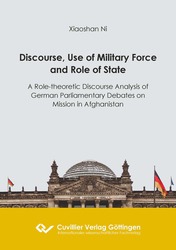| Fachbereiche | |
|---|---|
| Buchreihen (97) |
1381
|
| Nachhaltigkeit |
3
|
| Gesundheitswesen |
1
|
| Geisteswissenschaften |
2370
|
| Medienwissenschaften | 16 |
| Theologie | 57 |
| Philosophie | 102 |
| Rechtswissenschaft | 423 |
| Wirtschaftswissenschaften | 852 |
| Sozialwissenschaften | 417 |
| Sportwissenschaften | 48 |
| Psychologie | 233 |
| Pädagogik | 190 |
| Geschichtswissenschaften | 183 |
| Kunstwissenschaften | 111 |
| Kulturwissenschaften | 166 |
| Literaturwissenschaften | 117 |
| Sprachwissenschaften | 88 |
| Naturwissenschaften |
5407
|
| Ingenieurwissenschaften |
1798
|
| Allgemein |
98
|
|
Leitlinien Unfallchirurgie
5. Auflage bestellen |
|
Erweiterte Suche
Discourse, Use of Military Force and Role of State
A Role-theoretic Discourse Analysis of German Parliamentary Debates on Mission in Afghanistan
Xiaoshan Ni (Autor)Vorschau
Leseprobe, PDF (230 KB)
Inhaltsverzeichnis, PDF (120 KB)
As the prototype of the “civilian power”, Germany has always stressed the importance and necessity of diplomatic means to resolve crises. The participation of the Bundeswehr in the International Security Assistance Force (ISAF) in Afghanistan was a significant exercise of the new security policy after German reunification. Given that linguistic actors construct knowledge through their personal actions, security policy is necessarily reflected in the relevant discourses of political elites. This publication attempts to combine Linguistic Discourse Analysis and Role Theory to construct a role-theoretic discourse analysis approach for German security policy study: The parliamentary debate is a prerequisite for the legitimizing mandate for the use of the German military abroad; the topos/topoi and (pro-and contra-) arguments construct the parliamentary debate discourse and influence decisions on military action abroad; the use of the topos/topoi and arguments is constructed by the role perceptions of the German political elite, and the final decisions are the result of behavioral preferences influenced by role perceptions.
| ISBN-13 (Printausgabe) | 9783736976856 |
| ISBN-13 (E-Book) | 9783736966857 |
| Buchendformat | A5 |
| Sprache | Englisch |
| Seitenanzahl | 232 |
| Umschlagkaschierung | matt |
| Auflage | 1. |
| Erscheinungsort | Göttingen |
| Promotionsort | Shanghai |
| Erscheinungsdatum | 25.11.2022 |
| Allgemeine Einordnung | Dissertation |
| Fachbereiche |
Politologie
Sprachwissenschaften |
| Schlagwörter | discourse analysis, role-theoretic discourse analysis, linguistics discourse analysis (LDA), critical discourse analysis (CDA), politolinguistics, political linguistics, argument, argumentation, topos/topoi, argumentation patterns, Toulmin, corpus, German security policy, German parliamentary debate, minutes of speaking time, role of state, role theory, role prototype, role perception, Multilateralism, civilian power, normal state, agenda-setting role, foreign policy analysis, Federal Government, Federal Parliament, Federal Member of Parliament (MP), political elites, use of military, Bundeswehr, Gerhard Schröder, Angela Merkel, diachronic comparison, International Security Assistance Force (ISAF) mandate, Afghanistan, nation-building, alliance solidarity, German interests, NATO, UN, Diskursanalyse, Rollentheoretische Diskursanalyse, Linguistische Diskursanalyse (LDA), Kritische Diskursanalyse (CDA), Politolinguistik, Politische Linguistik, Argumentationsmuster, Korpus, Deutsche Sicherheitspolitik, Deutsche Parlamentsdebatte, Protokoll, Rolle des Staates, Rollentheorie, Rollenprototyp, Rollenwahrnehmung, Multilateralismus, zivile Macht, Normalstaat, Agenda-setzende Rolle, Analyse der Außenpolitik, Deutsche Regierung, Bundestag, Abgeordnete, politische Eliten, Militäreinsätze, diachroner Vergleich, Mandat der Internationalen Sicherheitsunterstützungstruppe (ISAF), Afghanistan, Wiederaufbau, Bündnissolidarität, Deutsche Interessen |
| URL zu externer Homepage | https://waiyu.usst.edu.cn/2020/1105/c2953a232889/page.htm |








